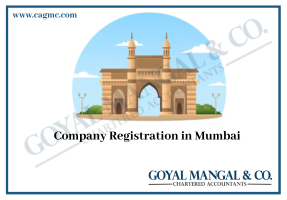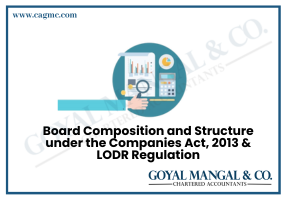
Borrowing cash is an important way for a firm to generate finance for large-scale initiatives and corporate expansion. Corporate borrowings are loans received by a firm by putting a charge on its assets as security to the lender. In this article, we will be discussing Charges and Charges under Section 77 to 87 of the Companies Act, 2013.
|
Table of Content |
Charges under Section 77 to 87 of Companies Act 2013
The concept of charge is outlined in Sections 77 to 87 of Chapter VI of the Companies Act, 2013. According to Section 2(16) of the Companies Act, 2013; a charge is an interest or lien issued on the property or assets of a company; or any of its undertakings or both as security, including a mortgage.
Types of Charges
There are two types’ charges as the Companies Act, 2013, which are as follows:
- Fixed Charge: A charge in relation with a single and distinct asset/property at the moment of charge formation. The Company will not be able to transfer such property until the charge holder (creditor) has been paid in full.
- Floating Charge: It refers to the floating and circulating character of a company’s assets, such as various debtors, stock in trade, and so on. The nature of the charged item may alter from time to time. If the Company or the enterprise ceases to be a going concern, the floating charge crystallises into a fixed charge.
Charges under Section 77 to 87 of Companies Act, 2013- Importance of Charge
Almost all big and small businesses rely on share capital and borrowed cash to fund their projects. Borrowed capital can be money raised by issuing debentures, which can be secured or unsecured, or cash obtained from a financial institution or bank.
Financial institutions will not lend money unless they are certain that their funds will be secure. Moreover, they will be refunded according to the agreed-upon repayment schedule, plus interest. For securing their loans, they create a right in the borrowing firms’ assets, which acts as a charge on assets. This is due to the execution of loan agreements, hypothecation agreements, mortgage deeds, and other similar documents that the borrowing firm is under obligation to complete in favour of lending institutions.
Applicable Provisions for Charges under Section 77 to 87 of Companies Act, 2013
The applicable provisions in relation to charges are under Section 77 to 87 of Companies Act, 2013, are as follows:
Section 77
The provisions of Section 77 of the Act relating to the registration of charges; shall apply to any company acquiring any property subject to a charge within the meaning of that section. Further, any modification in the terms or conditions, or the extent or operation of any charge registered under that section. When a charge gets registration with the Registrar of Companies, the company and/or the individual in whose favour the charge has registration will get a certificate of registration of the charge.
According to Section 77(1) of the Act, every company creating a charge on its property or assets, or any of its undertakings, whether tangible or intangible and located in or outside India, must register the particulars of the charge signed by the company and the charge-holder, as well as any instruments, if any, creating the charge, with the Registrar of Companies within thirty days of its creation.
Section 78
When a company fails to register a charge within the time as per section 77 of the Companies Act, 2013, the person (charge holder) may apply to the Registrar for registration of the charge, along with the instrument created for the charge, within such time and in the E-form CHG-1 or CHG-9, as the case may be, and the Registrar may, within 14 days after giving notice to the company, unregister the charge.
Section 80
Any person obtaining such property, assets, undertakings, or portion thereof, or any stake or interest therein, presumed to have notice of the charge from the date of such registration.
Section 81
In respect of each firm, the Registrar shall keep a registrar containing particulars of the charges registered under this Chapter in the form and manner required by the Registrar. Moreover, on payment of a fee, anybody can inspect the register.
Section 82
Within 300 days after the date of payment of the complete fee; the firm must notify the Registrar in Form CHG -4 for the purpose of satisfaction with the charge. The Registrar shall provide a certificate of registration of satisfaction of charge in Form No.CHG-5 when the Registrar enters a memorandum of full satisfaction of charge in accordance with section 82 or 83.
On receipt of an intimation under subsection (1), the Registrar shall transfer notice to the holder of the charge, requesting that he show cause within such time not exceeding 14 days, as may be in accordance with such notice, as to why payment or satisfaction in full should not be under record as per intimation to the Registrar, and if such holder of the charge fails to show cause, the Registrar shall order that a memorandum of satisfaction be present in the register.
Section 84
Notification of Receiver or Manager Appointment:
- If a person obtains an order appointing a receiver of, or a person to manage, a company’s property subject to a charge, or if a person appoints such receiver or person under any power contained in any instrument, he shall give notice of such appointment to the company and the Registrar within 30 days of the date of the order or of the making of the appointment, along with a copy of the order or instrument and a copy of the order or instrument.
- Further, any person appointed under subsection (1) shall provide notice to the company and the Registrar upon ceasing to hold such appointment, and the Registrar shall register such notice.
The Registrar must receive notification of appointment, cessation of a receiver; or a person to manage, a company’s property subject to charge, in Form No. CHG 6 together with a fee.
Section 85
Every company must keep a record of charges in Form CHG 7 at its registered office, which must contain all charges and floating charges affecting any of the company’s property or assets or any of its undertakings, specifying in each case such particulars as may be specified. The entries in the company’s charge record must be available as soon as possible after the charge is created, modified, or satisfied, as the case may be.
A director, the company’s secretary, or any other person authorized by the Board to do so must authenticate entries in the register. Moreover, they must keep the register of charges indefinitely, and the document that creates or modifies a charge must be there for a period of eight years from the date of the company’s satisfaction with the charge.
Section 86
If a company fails to comply with any of the terms, the company will be liable for a penalty of 5 Lakh rupees. Moreover, each officer of the company will be subject to a penalty of fifty thousand rupees. Further, any person who wilfully supplies any false or erroneous information; or knows suppresses any material information that needs to be on record under section 77 will be subject to action under section 447.
Section 87
The Central Government has made a correction to the Charges Register.
If the Central Government is satisfied that—
- The failure to notify the Registrar of the payment or satisfaction of a charge within the time required; or the failure to notify the Registrar of the payment or satisfaction of a charge within the time required; or the failure to notify the Registrar of the payment or satisfaction of a charge within the time required; or
- Further, any omission or misrepresentation of any particulars in any prior filing to the Registrar with relation to any such charge or modification thereof, or any memorandum of satisfaction or other entry made in accordance with sections 82 or 83.
It may, on the application of the company or any person and on such terms and conditions as it deems just and expedient direct that the time for giving intimation of payment or satisfaction be extending or, as the case may require, that the omission or misstatement be subject to rectification if the omission or misstatement was accidental or due to inadvertence or some other sufficient cause or it is not of a nature to prejudice the position of creditors or shareholders of the company.
Takeaway
The main goal of registering a Charge is to notify the Registrar of Companies (“RoC”). Further, to those who want to lend money to the firm about the encumbrance placed on the company’s assets. Moreover, by visiting the Ministry of Corporate Affairs web, the potential lender can review the index of Charges and forms.







